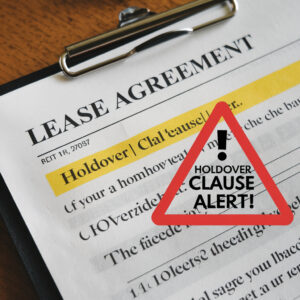- Home
- Retail
- Retail Investors Resources
- The Tiny Lease Clause That Could Cost You Big: Are You Protected?
The Tiny Lease Clause That Could Cost You Big: Are You Protected?
Avoid Massive Legal & Financial Headaches: What You Don’t Know About Holdover Clauses Could Hurt You!
Commercial leases are filled with legal jargon and small-print clauses, but there’s one seemingly insignificant section that holds immense importance: the holdover clause. While it may not be the first thing you consider when reviewing a lease, this clause could be the difference between a smooth transition and a legal or financial nightmare, for both tenants and landlords.
What Is a Holdover Clause, and Why Does It Matter?
At the heart of every commercial lease is a clear term: a defined start and end date. Once the term expires, tenants are expected to vacate the premises unless a renewal or extension has been negotiated. But what happens if they don’t?
The holdover clause dictates what occurs when a tenant overstays their lease. Unlike residential leases, where a lease expiration commonly just roll into a month-to-month agreement, commercial leases are far less forgiving. Overstaying often triggers:
- Significant Rent Increases:
- Most holdover clauses impose penalties such as a 50% increase in rent. If your rent was $30/SF, staying beyond your lease could hike your rate to $45/SF overnight!
- For tenants, this could be a financial strain you weren’t prepared for.
- Liability for Damages:
- Tenants may also be held financially responsible for any damages caused by their delay. For instance, if the landlord committed the space to a new tenant and you fail to vacate on time, any resulting costs, such as legal fees, contractor delays, or lost business, could be passed on to you.
- Legal Exposure for Landlords:
- A delayed handover could lead to lawsuits from the incoming tenant, particularly if the space was promised by a specific date. For example, if a major corporation like McDonald’s is the incoming tenant and the space isn’t delivered on time, they could hold the landlord in breach of contract and impose penalties or even sue the landlord, who, in turn, might pursue the exiting tenant for damages.
How Holdover Clauses Protect Both Parties
Despite their potential consequences, holdover clauses aren’t just about penalties; they’re about creating clarity and accountability.
Tenants:
A clear holdover clause ensures you know exactly what’s at stake. It pushes you to plan ahead and avoid costly penalties or legal disputes.
Landlords:
For landlords, the holdover clause is a vital safeguard. It protects against the financial and legal fallout of delays, helping to facilitate a smooth transition between tenants.

How to Protect Yourself
Whether you’re a tenant or a landlord, taking the time to understand and negotiate the holdover clause can save you headaches down the road.
Tenants:
- Understand Your Lease Terms:
- Carefully read your lease’s holdover clause. Does it include penalties? How are damages calculated? What are your responsibilities?
- Don’t assume the lease will automatically shift to a month-to-month, commercial leases rarely work that way.
- Plan Ahead:
- Begin discussions with your landlord 4-6 months before your lease ends. If you anticipate needing extra time, negotiate for a month-to-month extension or an short term renewal.
- Avoid last-minute surprises by scheduling your move-out date and coordinating with movers, contractors, and vendors well in advance.
Landlords:
- Draft a Strong Holdover Clause:
- Include clear penalties, such as a significant rent increase and tenant liability for any resulting damages.
- Use specific language to avoid ambiguity and ensure enforceability.
- Start Early:
- Open discussions with current tenants 3-6 months before their lease expires. Knowing your tenant plans helps you prepare for renewals or start marketing the space to new tenants.
- Communicate with prospective tenants and set realistic expectations for space delivery.
- Flexibility with a Plan:
- If the outgoing tenant needs additional time and there’s no immediate replacement, consider negotiating a short-term extension under agreed-upon terms to avoid disputes.
- Consider including a “safety buffer” between tenants where the start date of the new tenant is not the day after the day the leaving tenant’s is supposed to leave.
Why This Especially Matters in Strong Retail Markets?
If your property is located in a strong retail market, like the Dallas-Fort Worth retail real estate market (one of the most dynamic and competitive in the country), you should pay close attention to operational oriented clauses. With high demand for retail space and fast-moving lease transactions, holdover clauses play an essential role in keeping operations smooth and timelines intact.
For landlords, it’s about maintaining credibility and protecting relationships with high-value tenants. Delays in handing over a space to a national tenant or anchor store can have ripple effects across your portfolio.
For tenants, staying beyond your lease term without a plan can jeopardize your business finances, damage your reputation, and lead to unforeseen costs.
Real-World Scenarios: The Risks of Overlooking Holdover Clauses
- Scenario 1: The Overstaying Tenant
A tenant in a retail strip overstays their lease by two months. The landlord had already promised the space to a new tenant, who was ready to start construction. As a result, the landlord missed their delivery deadline, and the new tenant filed a lawsuit for breach of contract. The landlord’s legal and financial losses were passed back to the overstaying tenant. - Scenario 2: Landlord oversight in the contract
A landlord failed to include strong penalty provisions in their holdover clause. When a tenant overstayed, the landlord lost the incoming tenant and could not recover the costs for the delay, forcing them to absorb legal fees and construction overruns.
Take Action to Protect Your Interests
The holdover clause may be a small section in your lease, but its impact is anything but small. Whether you’re negotiating as a landlord or a tenant, make sure you:
- Understand the financial and legal implications.
- Plan ahead to avoid unexpected delays.
- Work with professionals who can help you craft or review the lease terms.
Tags: #EBG #RetailNavigator #DFWRealEstate #CommercialLeasing #RetailSuccess

